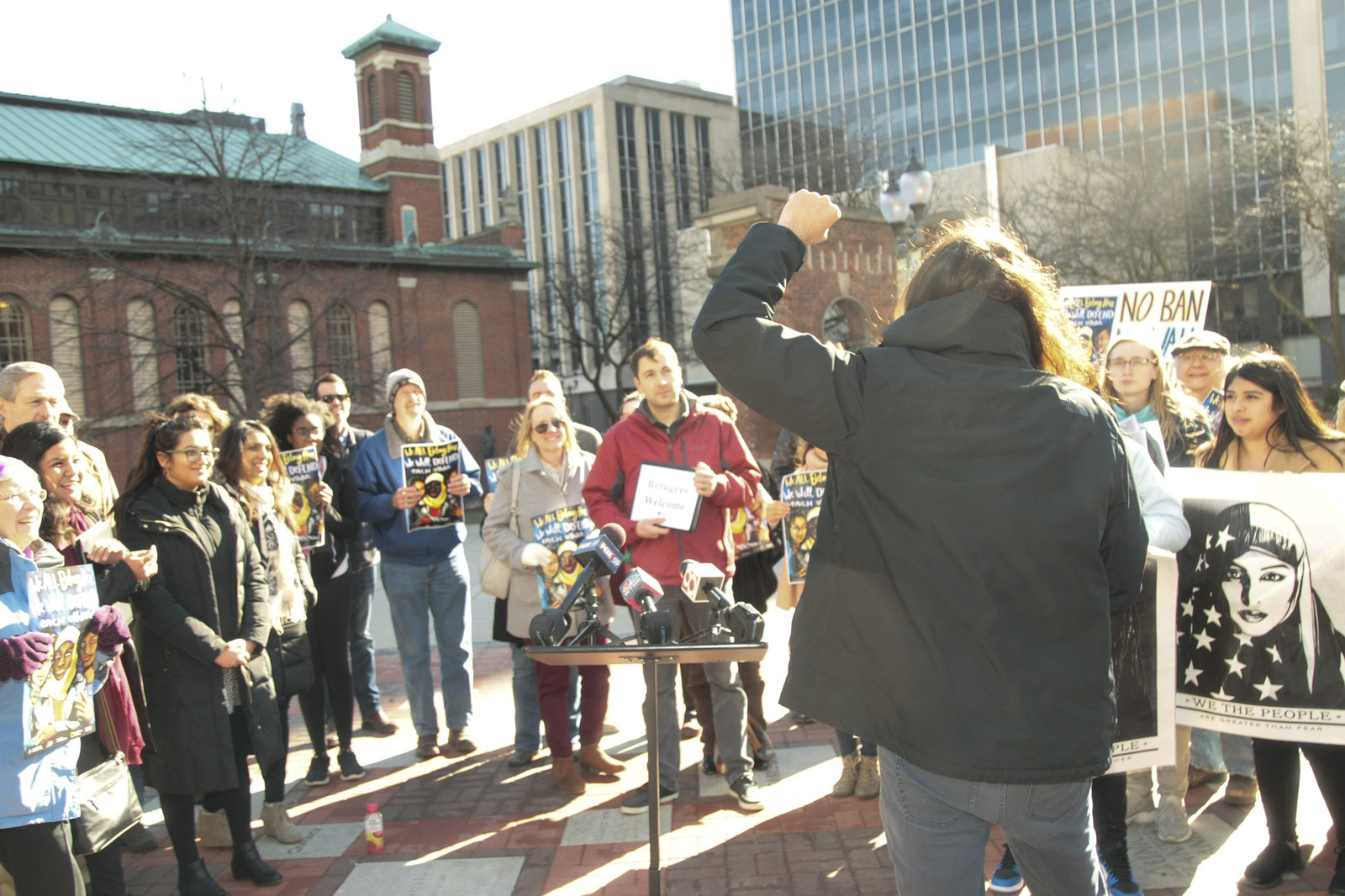
An interview with AFSC Communities Against Islamophobia trainers Umaymah Mohammad and Ahmed Abbas
Umaymah Mohammad and Ahmed Abbas work on AFSC’s Communities Against Islamophobia (CAI) project in Indianapolis as recipients of the Jane Brown McLeod Internship. As coordinator of CAI, I’ve been impressed with their work to train allies to recognize and counter anti-Muslim racism.
Last fall, Umaymah and Ahmed began offering trainings on political education within the Muslim community in response to requests from Muslim-led organizations that partner with AFSC.
Since then, they have trained hundreds of members of the Indianapolis Muslim community with their trainings. Now they’re forming a group of young Muslims who want to engage the community on anti-Muslim policies and practices, called the Young Muslim Collective. I recently spoke with them about this exciting new direction for their work.
Mary: What led you to start the Muslim Youth Collective?
Ahmed: We were all in the Communities Against Islamophobia national meeting, and all of the Muslims in the room started talking and realized that we were not reaching the affected community with our Islamophobia workshops, we were only doing ally training. We started talking about building up capacity within our own community by doing “train the trainer” workshops. It resonated, and we formed the Muslim Youth Collective to create a group of young people to really express themselves politically, and do it in creative ways.
Umaymah: I had that feeling when I first worked with CAI, I was thinking, “Who made this training? Were there enough Muslims who were part of the conversation? Why aren’t there more Muslims doing this work more broadly? “The Muslims working on CAI thought that a better use of these resources was to educate our own community. If we can’t identify and develop a collective language around Islamophobia within our community, how can we train allies? So this is our new path.
Mary: How have the Muslim-only trainings been different than training allies?
Umaymah: The first time you do it it’s rough. Last summer, Fatema Ahmad from Greensboro, Sofia Sami and Hoda Katebi from Chicago, Dina El-Rifai from Washington, D.C. and I all came together to do a pilot Muslim-only CAI training. It wasn’t perfect, but we created some new material on internalized Islamophobia that felt like it was working. There is a big difference when we as Muslim people talk amongst ourselves, and the conversation on Islamophobia is real. And when you’re talking about FBI entrapment, it’s not theoretical — it’s happening to our cousins, our homes, our masjid (mosque). Because the Muslim community understands this immediately, you can go deeper and get at the internalized Islamophobia. We want to better and address other issues like homophobia and misogyny in the community.
Ahmed: In our first two Muslim-only trainings in Indianapolis you could just tell that the young people have been waiting for this, there is an enchantment in their eyes. We exist in isolation, no interconnection between the masjids — and the reality is that we’re under attack both here and abroad. Umaymah’s idea is that we are creating a Muslim politics in the masjid.
We come from areas where people don't want to talk about trauma they have been through — and they are divided over class, and also race and ethnicity.
There is also a disconnection between Muslims and the mosque – people flock more toward the university than the mosque. Let us see what it means to organize in the mosque – there is a fear of people talking about the issues we address in our trainings, like anti-Muslim racism, surveillance and entrapment, because of backlash from the government. But young people aren’t interested in being scared.
Umaymah: What do we have to lose? How privileged do we have to be? Everybody feels censored and a general sense of fear to talk about the state and the Muslim community. There is fear to talk about surveillance, homophobia, misogyny.
I recently did a training with about 100 Muslims, who ranged from 10 years old to 70 years old. Something that stuck with me was a question a mother asked: “Why do we have to focus on the negatives?” I think another thing is that Muslim people who fled from political unrest who come here and become privileged forget that most Muslim people live in poverty globally. We need to think about what our lives would be. We want to reconnect with the whole Ummah, (Islamic community) we are all being targeted.
Ahmed: The Muslim diaspora wants to be American and that means take your social punishment and don’t complain. However, Black Muslims who are here, they might not have the same reality, our community is not monolithic.
Mary: What is it like doing this work in Indianapolis?
Ahmed: We have found that in Indianapolis, there doesn’t seem to be a sense of urgency. I stood up in front of a group of Muslims that we trained and asked, “What did you do when the Muslim Ban came down?” and crickets…. It’s because we didn’t know that Muslim people were being deported en masse, we don’t see ourselves in the undocumented, we don’t connect with the Black Muslim community. We are trying to figure out how can we bring that sense of urgency, so that those of us who are privileged can take action.
Umaymah: We are inspired by the Indiana Undocumented Youth Alliance. They are using bodies and minds in a way that people see them, and people don’t see the Muslim community. People think we are terrorists or potential terrorists, and we want to be human beings.